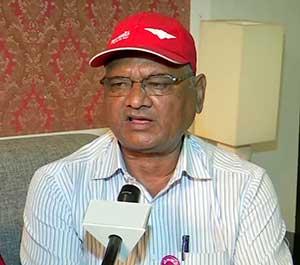'We will be hoisting the tiranga, but this kind of celebration is uncalled for when the farmers in this country are dying by suicides, their families are ravaged by poverty and farmers are not enjoying any freedom.'

Anil Ghanwat, president of the farmers' organisation Shetkari Sanghatna and the Swatantra Bharat Party, was a strong advocate of the three farm laws enacted by the Narendra Damodardas Modi government.
Ghanwat was a member of the Supreme Court-appointed farm panel that looked into suggesting recommendations to the Modi government on the three farm laws that were abrogated by Parliament later.
"We respect our Independence; we respect our Tricolour and our country. But it is useless to defend (the government's position) that we are in a very good state and nothing needs to be changed," the Shetkari Sanghatna president tells Prasanna D Zore/Rediff.com in the concluding segment of a two-part interview.
What amendments can correct the anomalies in India's agricultural policies as they exist today according to you?
A complete unshackling of agriculture; scrap the Essential Commodities Act; get rid of various Ceiling Acts (imposed on agricultural produce); Land Acquisition Act needs to be amended because given the political opposition it cannot be completely overhauled.
Give the farmers the freedom to choose whatever seeds, pesticides, weedicides and technology they want (to use). Many countries have given their farmers this freedom and they are producing five to ten times of what Indian farmers are producing.
India's production per acre or per hectare of cultivable land is right at the bottom because we lack the freedom of choice. We can compete with the world if we use agricultural best practices and bring in foreign currency.
India's weather and geography have rewarded India with the best resources to produce agricultural produce profitably on a commercial scale.
Our prime minister has said we can feed the world and that's very true. But if you are restricting exports, then how can Indian agriculture achieve its potential?
If these progressive farm practices are not allowed in India, whatever else you do will be in vain.
What has prompted governments since 1950s to impose restrictions on free trade in agricultural produce?
In the Nehruvian era, prime importance was given to industrialisation and for its rapid and profitable growth industrial and agricultural policies were designed to enable seamless and cheap supply of raw materials from the agricultural sector to the industries.
Cheap labour to work in these industries were also to come from rural India and so agricultural policies were designed to keep it non-profitable and non-remunerative for farmers for seamless supply of cheap labour and raw material from rural India.
Isn't that contradictory? If agricultural policies were so skewed against India's farmers, then why did the Indian farmer continue his occupation of farming?
The policies were so made that the Indian farmer was left with no alternative but continue his dependence on agriculture for subsistence. What else could the poor, uneducated, farmer do if not agriculture?
Those who could, migrated to cities and became coolies, worked as menial labourers in industries, rag pickers, etc. Thus, 60 per cent of the purchasing power of those residing in rural areas was finished off through such policies.
Consequently, this led to abysmal growth in aggregate demand for consumer goods in rural parts or else we would have more factories in India today.
You go to remote areas and ask how many people have washing machines, refrigerators; a few may have mixer-grinders that they could have received from their fathers-in-law. No one visits these shops to purchase these consumer durables.
There was no encouragement for setting up enterprises by poor farmers in rural India.
If the agriculture sector were to be in profit leading to more industrialisation and consequent employment generation we wouldn't be facing as acute a problem of unemployment as we are facing today.
But didn't the economic liberalisation policies adopted by the Narasimha Rao and Manmohan Singh governments do exactly what you have suggested here and yet today we still have the same restrictions on agriculture and farmers? How does the politicians today benefit from shackling agriculture by imposing restrictions on agriculture?
Today, the dynamics of our industrial and agricultural policies have changed much but famers still continue to suffer immensely. Today, any leader or political party who is in power wants to remain in power for a long time. For that such a leader has to ensure that the commodities or essentials of daily consumptions remain cheap.
To keep inflation low, at least price rise associated with food items of daily consumption for the consumerist classes, governments have to keep tight restrictions on imports and exports.
Even inter-district and inter-state trade in food items is restricted so that prices remain deflated artificially.
There have been instances when central agencies like the Enforcement Directorate and Income Tax Departments have raided onion merchants in Lasalgaon (India's and Asia's biggest onion producing region), Nashik and were threatened not to pay higher prices to farmers or face raids. Thus, these traders were forced to purchase onions at a lower price.
Keeping inflation under check improves the image of a government among the consumerist class, the voting class. There are anecdotes about how the (Atal Bihari) Vajpayee government lost (in 2004) because of steep rise in onion prices.
The governments today don't want such repetitions and so they keep the prices of rice, wheat, flour, onions, edible oil under artificial check.
Even this government is sacrificing the interests of the farmers for the interest of consumerist classes.
The industries that buy sugar for manufacturing beverages are buying sugar at a lower price because of artificial restrictions. The industries, benefit, the consumers benefit; everybody benefits except the farmers, who have to struggle to earn a fair price for their produce.
Why do you think that the Modi government first showed the gumption to enact the three farm laws - despite the knowledge that these laws would face huge political opposition -- that sought to do away with many restrictions on agriculture that you talked about but then wilted under pressure and scrapped them?
We had welcomed the move because they made the first, even if partial, attempt to unshackle agriculture from controls and we did suggest many recommendations and amendments to lift controls on agriculture but unfortunately, they were ignored.
But the Modi government did try to give us the freedom to sell outside the mandis (the APMCs or Agricultural Produce and Marketing Committees). That was a bold move because the farmers were exploited at these mandis.
Had those laws (enacted by the Modi government) been in force today, the farmers' cost of production and storage would have come down significantly as traders would have come to his doorstep for purchase of farm produce with all that is needed to transport his produce to the market.
The cost of packing the produce, loading and unloading it would have come down for the farmer. That was a good move but that law is now scrapped.
While these laws had removed restrictions on prices of five items from essential commodities' list, a clause was also inserted that allowed the government to bring back controls and restrictions if due to some reasons prices of these essential commodities shot up by 50 to 100 per cent.
The irony is that the day these laws were signed the same day there was an export ban on onions. So, the law was useless.
We had recommended complete scrapping of the Essential Commodities Act or increase the ceiling necessary to impose restrictions from 50 to 100 per cent to 75 to 200 per cent rise in prices of essentials.
 IMAGE: Anil Ghanwat. Photograph: ANI Photo
IMAGE: Anil Ghanwat. Photograph: ANI PhotoWe are living at a time when anybody who opposes the Modi government or its programmes is immediately labelled anti-national. Do you worry that the Swatantra Bharat Party and the farmers who support your agitation by not celebrating Har Ghar Tiranga too will be labeled anti-nationals?
We are only opposed to celebrating August 15 as envisaged by the government. We will be celebrating our Independence Day this year as we celebrated it the last year and all the years before that.
We will be hoisting the tiranga, but this kind of celebration is uncalled for when the farmers in this country are dying by suicides, their families are ravaged by poverty and farmers are not enjoying any freedom.
In this situation the question is: Why should we celebrate?
Our agitation is to highlight the plight of farmers in this country to the state and Union government. The farmers are not happy and the policies need to be changed because they are harming not just the farmers but every single person in this country.
That's our message to the government. We are not anti-nationals; farmers' children serve in the Indian Army, Indian Navy and Indian Air Force.
We respect our Independence; we respect our Tricolour and our country. But it is useless to defend (the government's position) that we are in a very good state and nothing needs to be changed.
Feature Presentation: Ashish Narsale/Rediff.com










